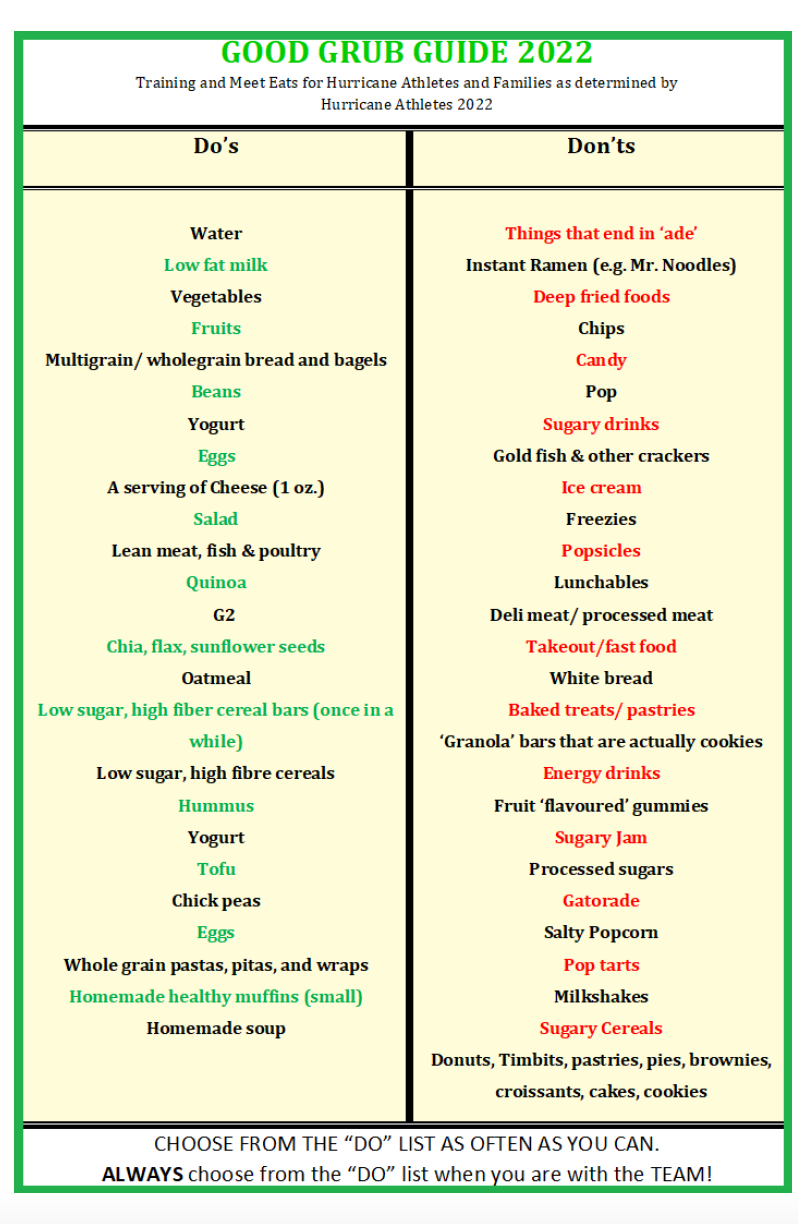Good Grub Guide
Download/Print HERE.

Everything you wanted to know
ABOUT FOOD
But Were Afraid To Ask . . .
Vehicles work well with proper fuel and maintenance. Just like vehicles, bodies require proper fuel and maintenance to work their best. Training and/or competing ask a lot from our bodies. If you want it to perform well for you while training, competing, of in life in general, it is important to offer it the best fuel possible.
Food, by definition, is: any nutritious substance that people or animals eat or drink, or that plants absorb, in order to maintain life and growth.
Food gives us energy (calories) and nutrition (vitamins, minerals, essential amino acids, and dietary fiber).
Foods that give us energy and lots of nutrition are call NUTRIENT DENSE foods. Stuff that gives us energy without much nutrition is just that…stuff. Some people call this ‘stuff’ EMPTY CALORIE food.
For good health, optimal growth, best performance, and body repair we need to do our best to make sure that our energy sources are packed with nutrients.
Types of Food Energy Sources:
Simple carbohydrates (glucose, sugar, honey and fruit juices) are digested rapidly and reach the bloodstream in approximately five minutes. That makes them the most readily available food energy source for the body. Excess amounts are not encouraged as they tend to draw fluid from other parts of the body which may result in nausea or general abdominal discomfort.
Complex carbohydrates (whole grain breads and cereal products, fresh fruits and vegetables) are the “starchy” foods that require roughly twenty minutes of digestion to be broken down into simple sugars and to enter the bloodstream.
Protein sources (meat, fish, eggs, nuts, cheese and milk) require a longer period -approximately two hours - to be broken down and utilised by the body as energy. When there is a mixture of carbohydrate and protein, the entry of sugar into the bloodstream is more gradual.
Fats are the last of the nutrients to be broken down and absorbed. They require approximately four hours to be broken down into fatty acids.
When making energy choices ALWAYS check to see that you are getting NUTRIENTS with your energy. Ask what nutrients the energy source provides. Check to see that the amounts of nutrients in your food choices will actually have positive impact on your body. Also, be sure to fuel up with the right amount of energy. Put in a little fuel in for short trips and fill the tank for long trips.
FUELING FOR COMPETITION
This is not the time to experiment with new foods! Keep it simple, and include lots of fruits, vegetables and liquids. Carbohydrates, especially those of the fruit and whole grain variety, are your best bet.
Meet packages are emailed and posted on the web site. Each package contains a schedule of the order of events for that day. Review the schedule but remember that meets can - and do - run over the expected time. Keep track of the time yourself and don’t rely on the schedule.
The athletes are in and out of the water repeatedly; the longer the gap between events, the more time the body has to digest solid foods. Keep an eye on both the clock and the schedule and you should be able to judge when to eat and when not to, as well as the best type of fuel for the time frame. And please, be respectful of your coaches’ wishes and your teammates’ goals when choosing the contents of your cooler. Do our athletes a favour and crack open a smorgasbord of nutritious energy sources! Support your athlete, your health and the team! ☺
Some Things to Remember to Keep Your Motor Running . . . And Cheaper Than Gas ☺
-
Canada’s Food Guide still works.
-
Eat before you work out and at meets - this is not the time to skip meals.
-
Eat (sparingly!) at least 45 minutes before you train or compete. Remember that simple sugars at this time can cause you to crash during your race.
-
On training and meet days, eat solid foods that are easy to digest and high in complex carbohydrates.
-
On meet days, avoid slow-to-digest energy sources.
-
Stay hydrated - drink lots of water.
More information about hydration and training, travel, and competition nutrition is offered during the summer season and is available from the Program Coordinator and Coaching Staff.

 Email
Email Print
Print
